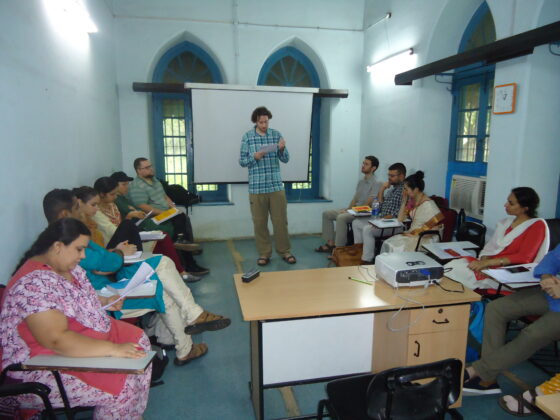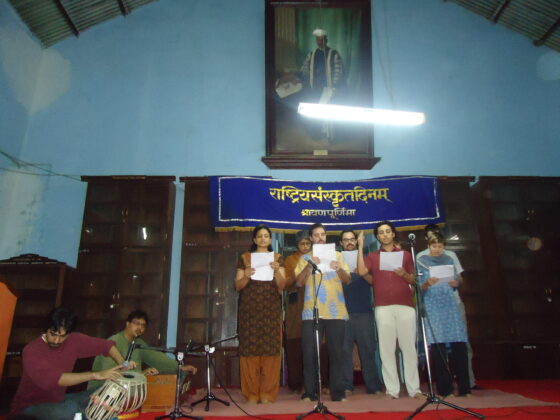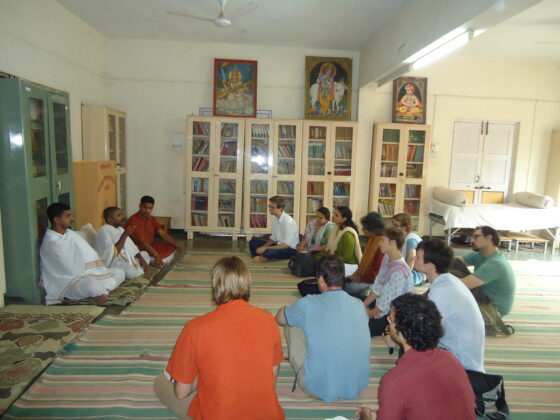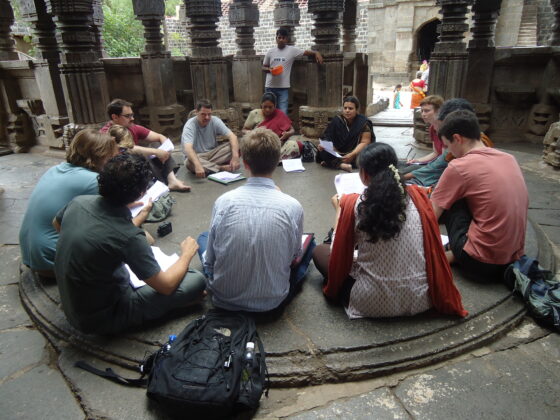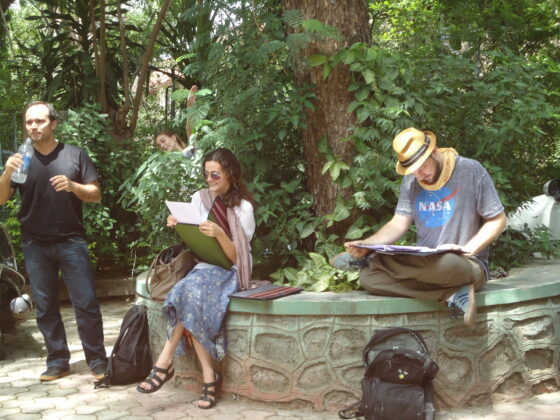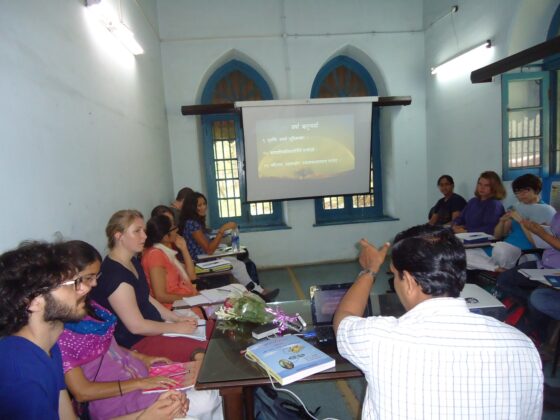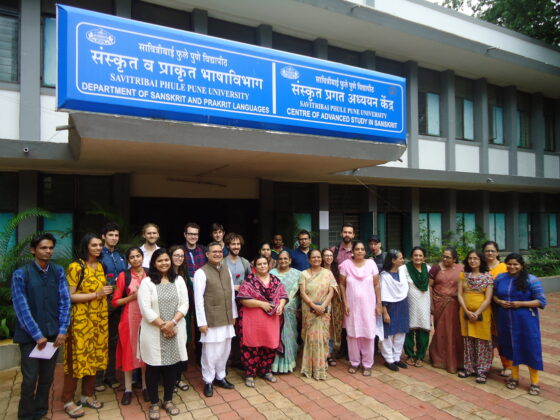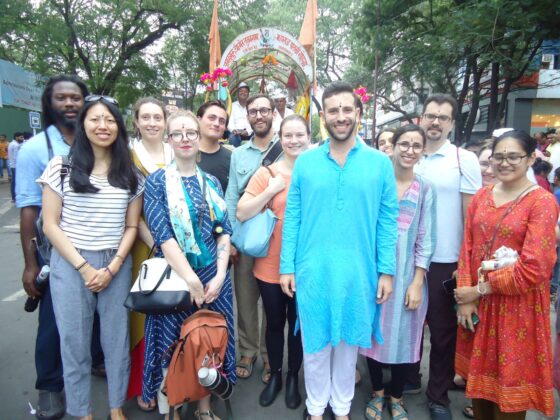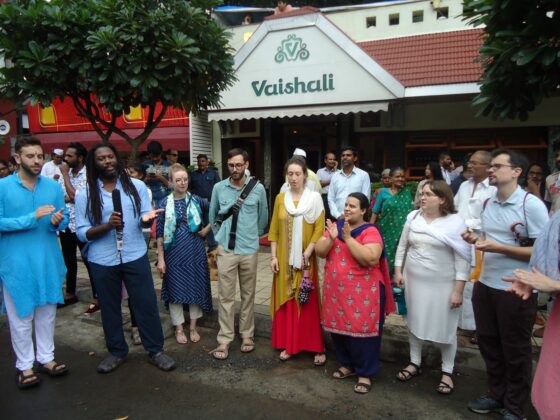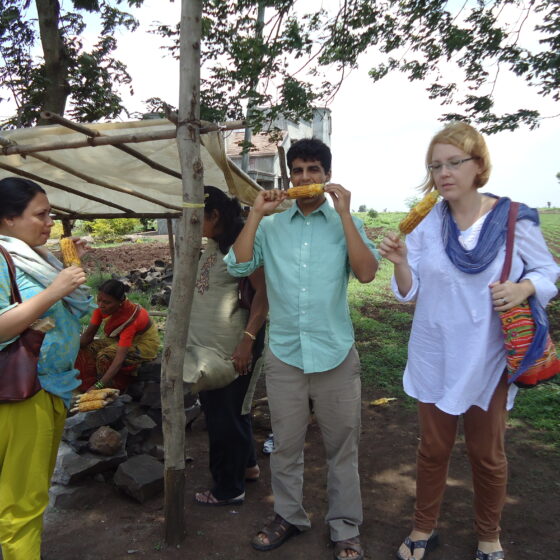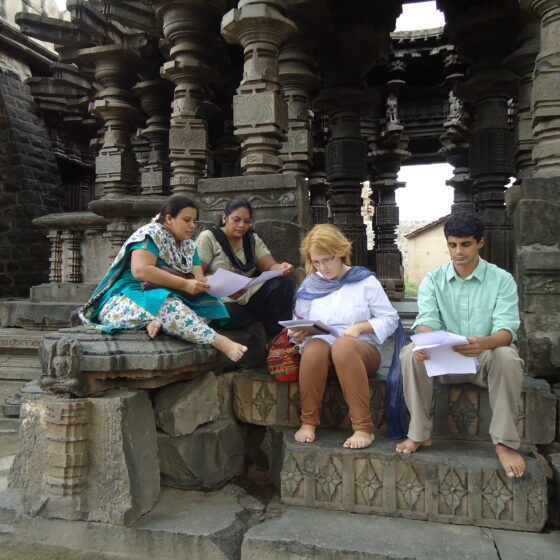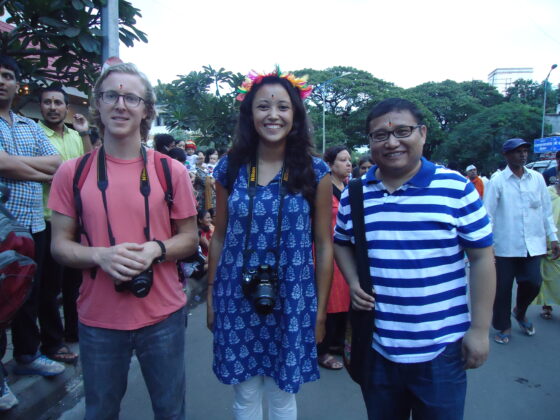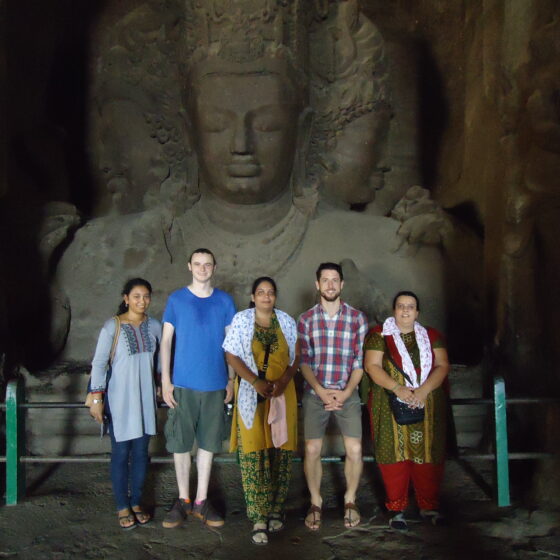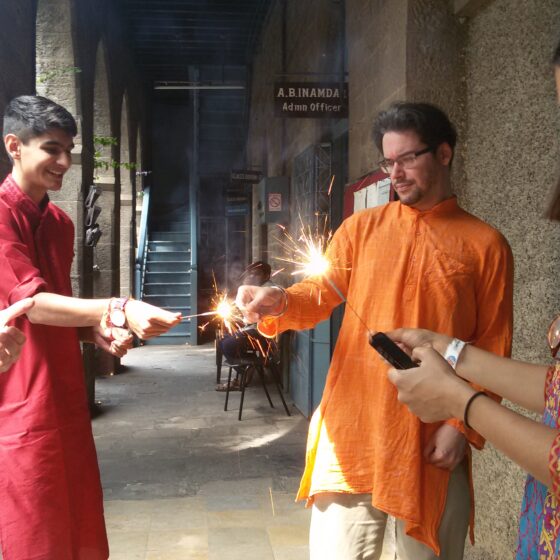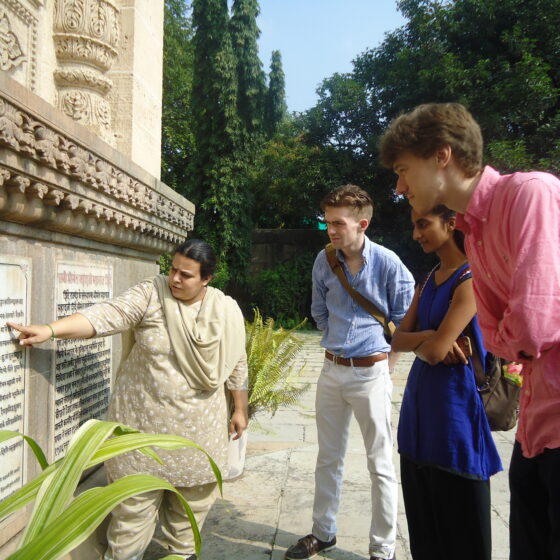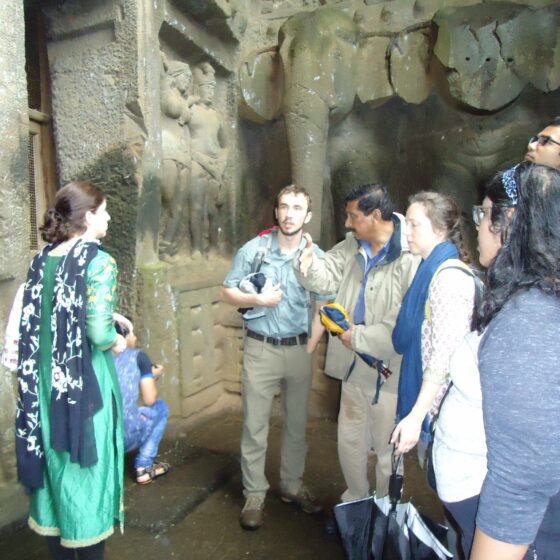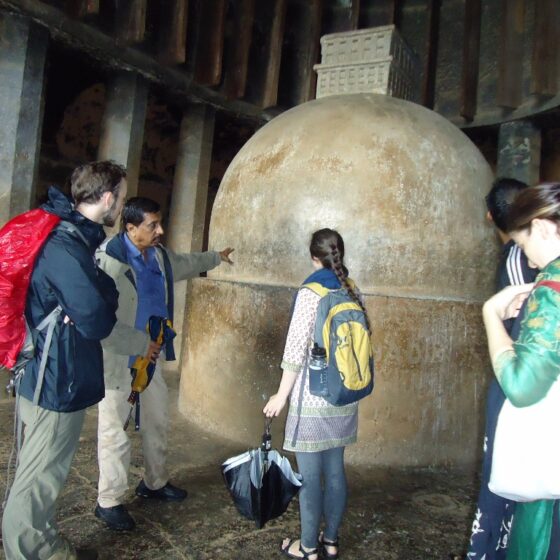In addition to providing rigorous structured instruction in the four skills areas: reading, writing, listening and speaking, students are invited to select Sanskrit texts, such as poems, scientific and medical texts, or selections from among the many Sanskrit epics, to read with instructors during personal tutorials. Texts studied during the regular classes and individual tutorials include Sanskrit literature such as Panchatantra / Hitopadesha Ramayana, Mahabharata, the Upanishads, Ghanaśyāma’s Ānandasundarī, the Natyashastra, Adi Shankaracarya’s Brahma Sutra Bhasya, Shataka literature, Sanskrit drama, and Temple epigraphy.
During the course of the program, speakers are invited to the Sanskrit program house to deliver presentations to the students, followed by an opportunity for Q & A. One speaker in the summer of 2022, Dr. Prasad Joshi, spoke about the large corpus of modern (twentieth and twenty-first century) Sanskrit literature in Maharashtra. He noted that the life stories of modern heroes of Indian history are featured in many of these literary productions, adding that the authors have not deviated from the basic grammar rules and poetic parameters of Classical Sanskrit literature, while at the same time introducing new vocabulary words, often adapted from English and Marathi.
Field trips are also an important (and enjoyable) component to the Sanskrit program. Summer 2019 students visited the Wari, an annual procession to the pilgrimage site of Pandharpur, the seat of Vitthala. Students watched devotees walk on the street singing bhajans and dancing and learned how to sing the Bhajans themselves. Some carried the tulasi plant on their head as a vow while others carried the Vitthal idol on their head.
Another favorite trip in the summer 2017 was to Karla and Bhaja caves. Bhaja Caves is a group of 22 rock-cut Buddhist caves dating to the 2nd century B.C. One of the caves has a pillared verandah in front and is decorated with unique reliefs. The Karla Caves date from the 2nd Century B.C. to the 4th Century AD. The oldest cave, dated around 160 B.C., arose near a major ancient trade route running from the Arabian Sea to the Deccan. Dr. Shrikant Jadhav, an archaeologist and specialist in rock-cut caves, accompanied the group and discussed the caves.
Students went on a field trip to Kolhapur and Khidrapur. At Kolhapur students visited the 10th century Shilahara temple of Mahalaxmi. An archaeologist, Dr. Shrikant Ganvir, talked about the temple architecture and the socio-religious history of the Mahalaxmi temple. Students also viewed an inscription written in Devanagari script. At Khidrapur students visited the Koppeshwar temple and inscriptions. Students also visited a Jain Basati. This visit helped students to understand the regional history and the style of inscription writing in Devanagari script.
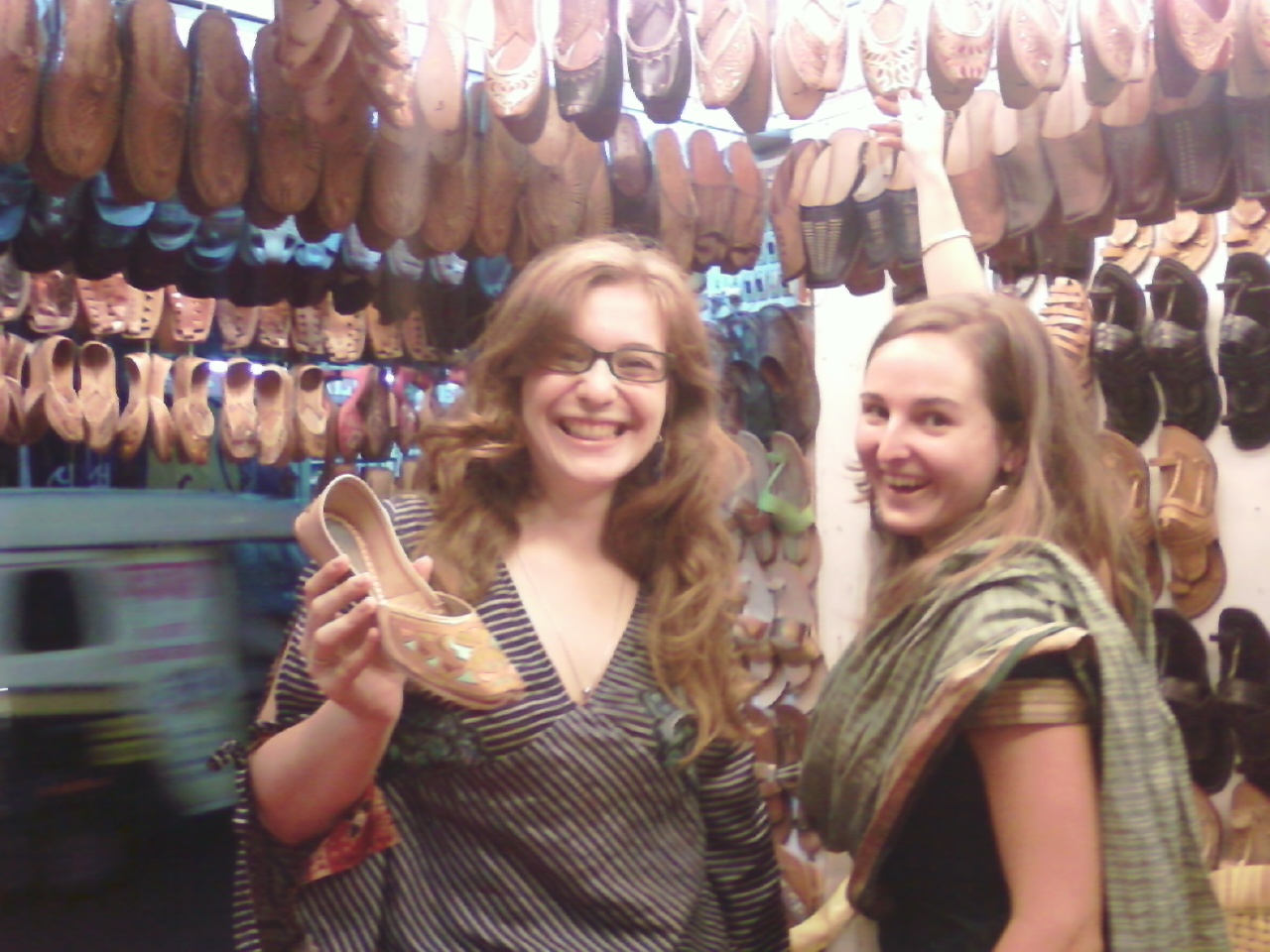
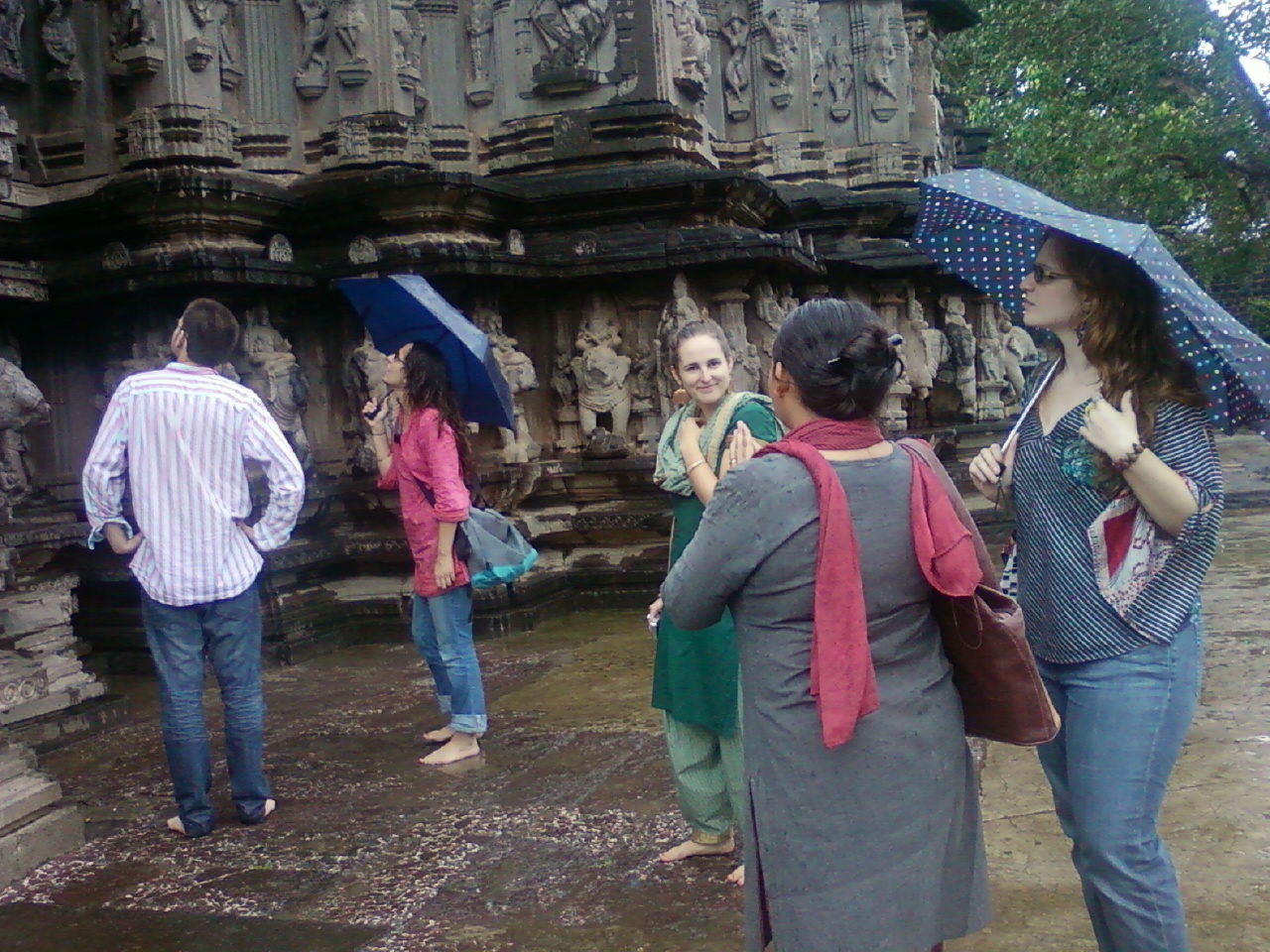
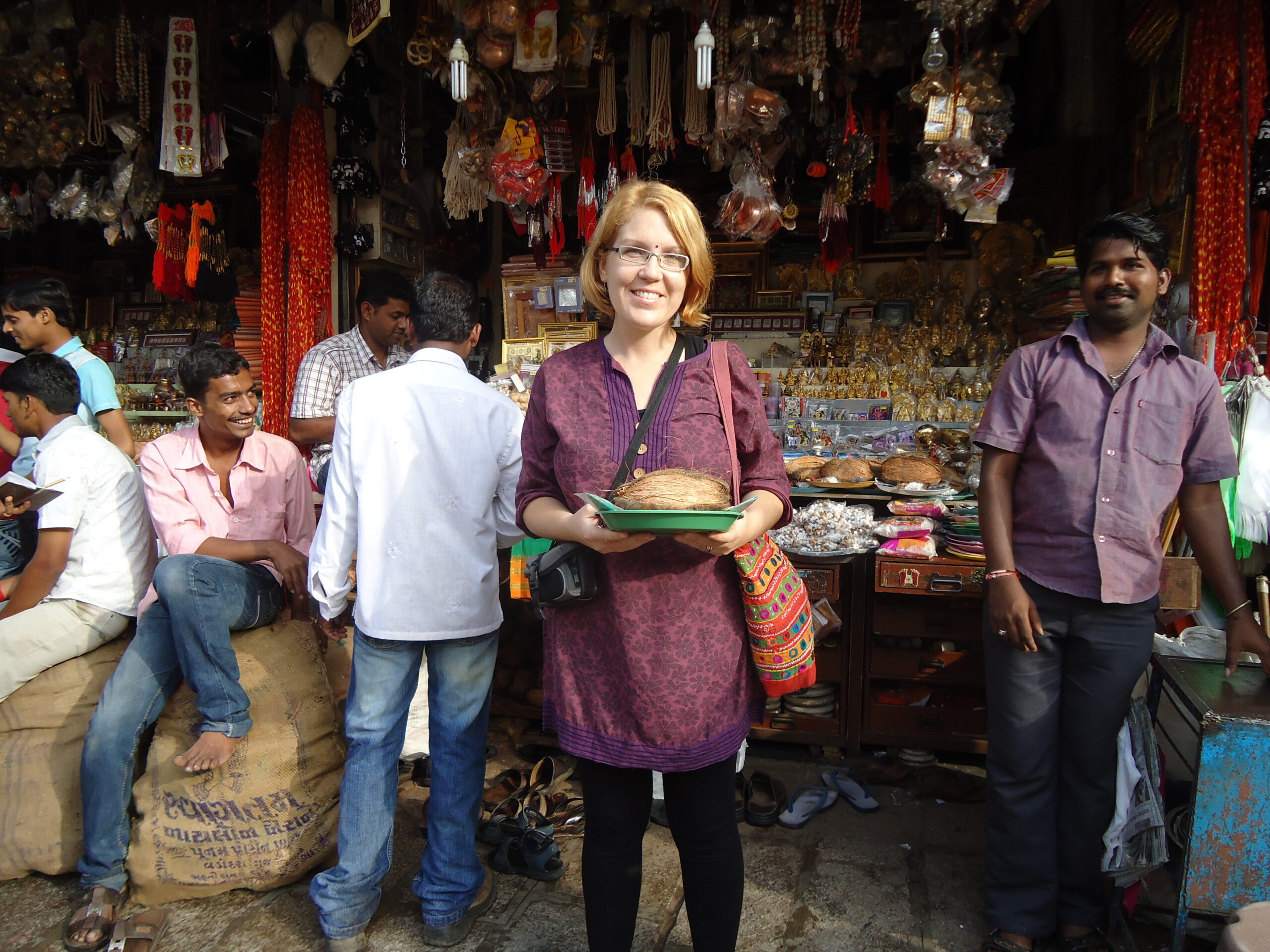
Over the last twenty years, the program has become more popular as students recognize the noteworthy progress in their language proficiency from participating in this course. From time to time, the program has adapted, altered, and systematized its pedagogy to suit students’ needs. Eventually a class on meter was added in the academic year program, alongside reading the śāstra literature. Students have read portions from texts of various genres, such as Buddhism, Jainism, Mathematics, Music, Dance, Dramaturgy, Philosophy and so on. Many past students are teaching Sanskrit now and are professors at various universities. They also encouraging their students to participate in the AIIS Sanskrit program. This continuous flow of transmission of language acquisition from teacher to student is the real success of this program.
— Dr. Madhura Godbole, Head Sanskrit Language Program
From our students
Over the course of ten weeks that were as inspiring as they were strenuous, the power of approaching Sanskrit as a living language was slowly revealed. My teachers were patient, rigorous, generous, and kind. They were also funny, which helped get us through the late nights of journaling—in Sanskrit! By the end of the program, I had presented an illustrated talk, also in Sanskrit! While I may not need to compose Sanskrit sentences on a daily basis, the AIIS summer language program continues to benefit my career today. As a curator at the Smithsonian’s National Museum of Asian Art, the foundational Sanskrit training I received enables me to share with visitors the roots and stories behind deity names, architectural elements, and conceptual terms that they encounter in our galleries.
— Emma Natalya Stein, Assistant Curator of South and Southeast Asian Art at the Freer Gallery of Art and Arthur M. Sackler Gallery, the Smithsonian’s National Museum of Asian Art
Participating in the AIIS Sanskrit Summer Language Program in 2016 was nothing short of a life-shaping experience for me. After taking a few semesters of Sanskrit at UT Austin, entering an immersive environment where our incredible teachers pushed us to think, joke, argue, and dream in Sanskrit was an intensely challenging and exhilarating experience. My experience of reading Sanskrit in this personalized way attuned me to the very human voices behind treatises such as Natyashastra, where snarky comments and practical suggestions for performance abound. Working with scholars of Madhura ji and Meenal ji’s caliber was an honor and blessing for my academic and artistic pursuits then and now.
— Aruna Kharod, PhD Candidate, Ethnomusicology, Harrington Dissertation Fellow, The University of Texas at Austin
The AIIS Sanskrit program was invaluable to my growth as a scholar. I treasure the memories of the teachers and staff who exposed me to Sanskrit as a living tradition and to the culture of Pune and Maharashtra. From performing in a Sanskrit play, to learning beautiful shlokas, to an enriching homestay, I am forever grateful for the opportunities generously provided by the Institute. I especially benefited from the chance to study with Dr. Prasad Joshi, who tutored me in the reading of Sanskrit commentary on yoga. To this day I reflect on his erudition, endless patience, and sensitivity to nuance. I learned so much from Dr. Madhura Godbole and the other teachers, and they changed my life.
— Peter Valdina, Chair and Associate Professor, Religious Studies Albion College
AIIS Sanskrit was incredibly helpful in my growth as a scholar of classical Telugu. It was truly an honor to learn from women Sanskritists Madhuraji and Meenalji, who exposed us to a range of texts, grammatical concepts, and spoken Sanskrit. The various fieldtrips, including watching a live Nyaya debate, supplemented the outstanding in-class instruction. I also formed lasting friendships with colleagues in the program and cherished my time in Pune.
– Harshita Mruthinti Kamath, Visweswara Rao and Sita Koppaka Associate Professor in Telugu Culture, Literature, and History Emory University
AIIS Sanskrit on Stage
AIIS Sanskrit Students Perform Play at Sanskrit Drama Competition
Students on the AIIS academic year Sanskrit program in Pune Carol Rodriguez-Gutierrez (University of Florida) and Shuheng Zhang (University of Pennsylvania) performed a play entirely in Sanskrit language at the R.N. Dandekar Sanskrit Drama Competition at Fergusson College in Pune on March 28, 2023.
Sa Sumaramani—meaning “That Flower Girl” is a 35-minute one-act play based on George Bernard Shaw’s Pygmalion. The play, which is completely in Sanskrit, was written by AIIS Sanskrit program head Dr. Madhura Godbole; the two students had to memorize all their dialogue in Sanskrit.
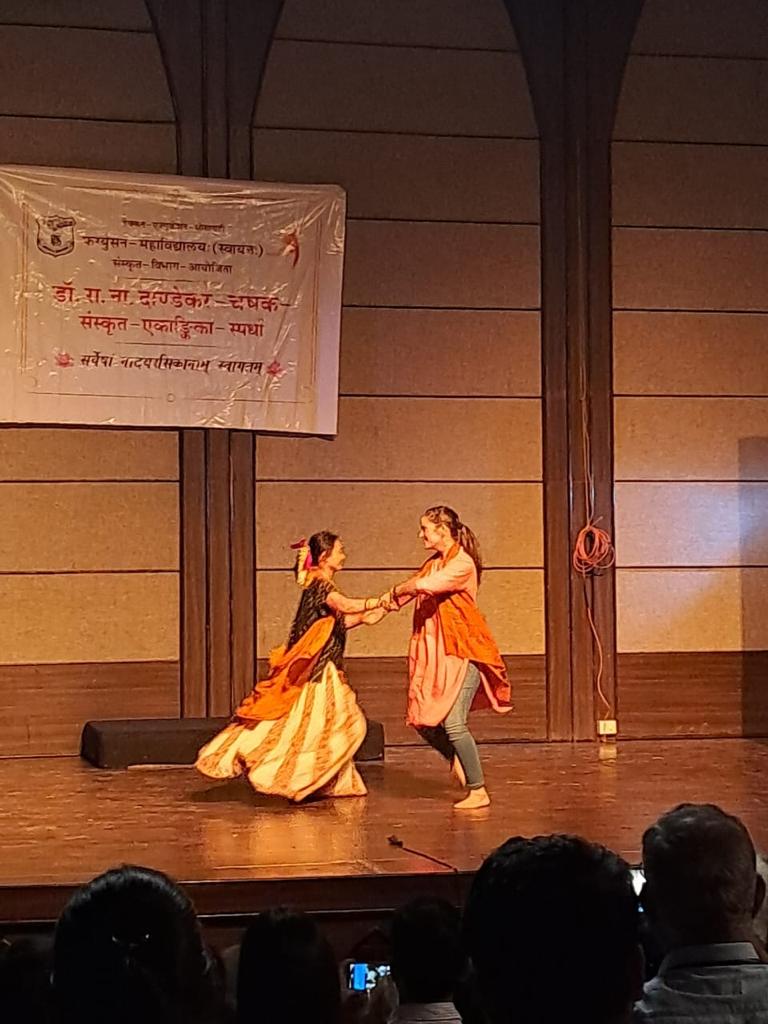
60th Anniversary Series – Robert P. Goldman on AIIS, Sanskrit Pedagogy, and Emerging Trends in Sanskrit Research
In this episode of our 60th anniversary series, we have the unique honor of speaking to a scholar who has been part of the foundational landscape of Sanskrit scholarship and education in the United States, Robert Goldman, Professor of the Graduate School and Catherine and William L. Magistretti Distinguished Professor of Sanskrit Emeritus at the University of California Berkeley. Besides helping to shape Sanskrit pedagogy in the US and publishing influential translations of a wide variety of Sanskrit literary works, Dr. Goldman has also been very active with AIIS – first as a junior and senior fellow, then a trustee and vice president of the institute.
As we look back on sixty years of AIIS, not only has the institute supported research across disciplines and created an important support system for the study of India in the United States, but AIIS has also been a critical part of language pedagogy for undergraduate and graduate students. In this episode, we’ll hear about AIIS and its role in development of Sanskrit pedagogy and scholarship in the US, Dr. Goldman’s own work and intersections with the institute, and the future of AIIS, language study, and Sanskrit in the US.
Produced by AIIS
Music “Desh” by Stephen Slawek
From our teachers
Sanskrit Language Program at AIIS has always been an enriching experience. Teaching Sanskrit to students in innovative ways with various techniques makes this program unique and interesting. It is an honour to be a part of it.
— Ms. Sampada Nadkarni
Sanskrit language program is one of a kind, which helps students to understand the different aspects of Sanskrit language which are simple and complex at the same time. It enables them to be mindful about the ancient Indian language. Teaching at AIIS Sanskrit Program is a refreshing experience.
— Ms. Arundhati Dandekar
Sanskrit program is keeping language alive through its four-skilled-approach. Students enjoy it and become more creative with language. I feel happy to be a part of it. Everything we do as teachers ensures that the student’s inherent desire to learn this language is kept alive. This is the success-key of this program.
— Dr. Meenal Kulkarni
Alumnae of the Sanskrit program have gone on to pursue careers inside and outside of academia. Many former Sanskrit program participants are faculty at institutions of higher education, some teaching Sanskrit to the next generation of students. Some of our alumnae are :
Michael Allen (summer 2007) assistant professor Department of Religious Studies University of Virginia
Arun Brahmbhatt (summer 2008) assistant professor Religious Studies Dept St. Lawrence University
Shaman Hatley (summer 2003) associate professor Department of Asian Studies University of Massachusetts Boston
Gloria Hernandez (summer 2007) associate professor Department of Languages and Cultures Westchester University
Ayesha Irani (summer 2013) associate professor Department of Asian Studies University of Massachusetts Boston
Nicole Karapanagiotis (summer 2006) associate professor Department of Philosophy and Religion Rutgers University Camden
Jinah Kim (summer 2001) professor Department of History of Art and Architecture Harvard University
Matthew Lopresti (summer 2003) state representative Hawaii State Legislature and Chair Asian Studies Program Hawai’i Pacific University
Nabanjan Maitra (summer 2013) assistant professor Department of Asian Studies University of Texas
Ashwin Manthripragada (summer 2008) formerly professor of German and Media Studies Hobart and Smith College, currently executive director Quail Springs Permaculture
Luther Obrock (summer 2006) assistant prof Dept of Historical Studies University of Toronto Mississauga
Purvi Parikh (summer 2008) assistant professor Department of Religious Studies Muhlenberg College
Harpreet Singh (summer 2008) Chaplain Harvard University
Emma Natalya Stein (summer 2012) assistant curator South and SE Asian Art, National Museum of Asian Art (Freer Sackler)
Eric Steinschneider (summer 2008) assistant professor Department of Philosophy and Religion, Ithaca College
David Tomlinson (summer 2013) assistant professor Department of Philosophy Villanova University
Peter Valdina (summer 2004) associate professor Department of Religious Studies Albion College
Luke Whitmore (summer 2004) associate professor Department of Philosophy University of Wisconsin Stevens Point
AIIS is immensely grateful for the support provided to its Sanskrit program over many years by the University of California, Berkeley’s Institute for South Asia Studies. This support has enabled many students, who otherwise would not have been able to obtain funding, to participate in our Sanskrit program.

